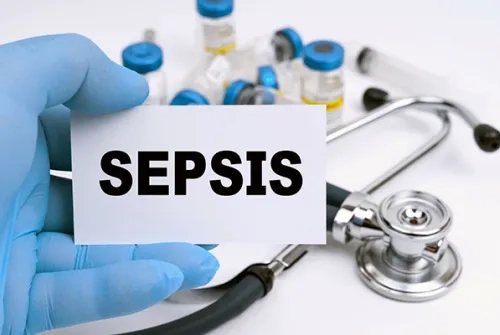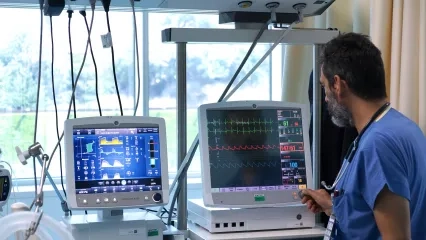Alo Yeditepe
Alo Yeditepe
Sepsis Costs the Life of One Person Every 2.8 Seconds!
Sepsis, which is not known enough despite affecting human life this much, causes one loss of life every 2.8 seconds. Intensive Care Specialist Prof. Dr. Sibel Temür pointed out that when the focus of infection is not treated, sepsis or even septic shock, which spreads throughout the body through the bloodstream and leads to organ failure, can develop not only in people with weak immunity but also in healthy people.
Sepsis, a crucial health problem accompanied by infection and organ failure, is the deadliest of all causes of hospitalization. Pointing out that 11 million people lose their lives every year worldwide due to this disease, which can occur in every age group, Yeditepe University Kozyatağı Hospital, Anesthesia, and Reanimation Department Intensive Care Specialist Prof. Dr. Sibel Temür said, “Every year, 47-50 million people develop sepsis worldwide, and one person dies due to sepsis every 2.8 seconds on average. About 50 percent of survivors, on the other hand, develop physical or psychological disorders that last for a lifetime.”
“Inadequate Awareness Makes it Difficult to Diagnose”
Pointing out that the diagnosis and treatment of sepsis is also a challenging problem and the incidence of the disease increase by nine percent every year, Yeditepe University Hospitals Department of Anesthesiology and Reanimation, Intensive Care Specialist Prof. Dr. Sibel Temür gave the following information on the subject: "Sepsis is a life-threatening organ dysfunction that occurs due to an abnormal and excessive immune response of the host to any infection." It is a combination of infection and organ failure. An infection starting at a particular focus in the body can progress when left untreated and spread through the blood system, creating signs that cover the entire body and a picture of damage and organ failure in various organ systems. Therefore, every infection has a risk of turning into sepsis.”
Noting that the disease can be diagnosed based on clinical and laboratory findings, Prof. Dr. Sibel Temür continued her words as follows: "In sepsis, the signs may also vary because organ failure and infection coexist." In some cases, signs of infection, and in other cases, signs of organ failure may come to the fore. For this reason, it should also be evaluated whether there is an organ failure in cases where the infection is at the forefront. Sepsis is diagnosed based on clinical and laboratory findings. Clinical signs of infection can be systemic signs such as speech disorder, blurred consciousness, fever, tremor, muscle pain, inability to urinate, severe respiratory distress, the feeling of death, skin spots, and pallor, while signs belonging to the infection focus can also be more prominent. In the septic shock picture, we observed that the patient's blood pressure drops too low, their pulse becomes irregular, the circulation is disrupted, and tissue oxygenation decreases to the level of hypoxia.”
"Sepsis Requires Urgent Treatment”
Prof. Dr. Pointing out that treatment of the disease requires urgency, Sibel Temür said that hospital mortality due to sepsis decreases from 60 percent to about 20 percent with early and effective intervention within the first hour. Emphasizing that the pathogen causing sepsis can be bacterial, viral, fungal, parasitic, or an unknown infection and that anti-biotherapy for the specific pathogen is vital in the treatment, Prof. Dr. Sibel Temür said, "While both clinical and laboratory assessment of the patient is performed quickly, initiating the necessary liquid and anti-biotherapy is of priority. According to the patient's blood culture, the antibiotic initiated as broad spectrum is narrowed down within a few days and switched to an antibiotic specific only to the pathogenic microbe that could have been detected.”
"Without Effective Antibiotherapy, Loss of Life is Inevitable in Sepsis”
Drawing attention to the fact that the issue of antibiotic resistance, which is a highly important problem for the whole world, is also critical for the treatment of sepsis, Prof. Dr. Sibel Temür said, "The irrational use of broad-spectrum antibacterial antibiotics, which have no antiviral effect at all in simple viral upper respiratory tract diseases, causes the body to develop resistance. Not only unnecessary use of antibiotics but also failure to use them at correct time intervals and for an effective duration can lead to the formation of antibiotic resistance. In this case, the antibiotics administered in case of sepsis fall short of being effective due to this resistance developed, and unfortunately, the patient may become vulnerable to microbes for the sake of treatment.”
Individual and Social Measures are Required
Underlining that sepsis is a crucial health problem for our country, just as all around the world, and social awareness must increase to prevent it, Yeditepe University Hospitals Department of Anesthesiology and Reanimation, Intensive Care Specialist Prof. Dr. Sibel Temür gave the following information about the precautions that must be taken:
“First of all, individual hygiene should be ensured, and the habit of hand washing, which has become even more critical, especially considering the period we are in, should be developed. This culture should be raised in our children. In addition, another important point is to avoid the unnecessary use of antibiotics and prevent the development of antibiotic resistance. Antibiotics should be used as needed, only under the supervision of a physician, and in the prescribed way. Establishing infection prevention and control programs and increasing social awareness are also among the things needed to be done in general.”
Press Coverage: haberturk | mynet | cumhuriyet | gazetevatan | sondakika
About
Faculty and Year of Graduation:
Ankara University School of Medicine, 1992
Alo Yeditepe





